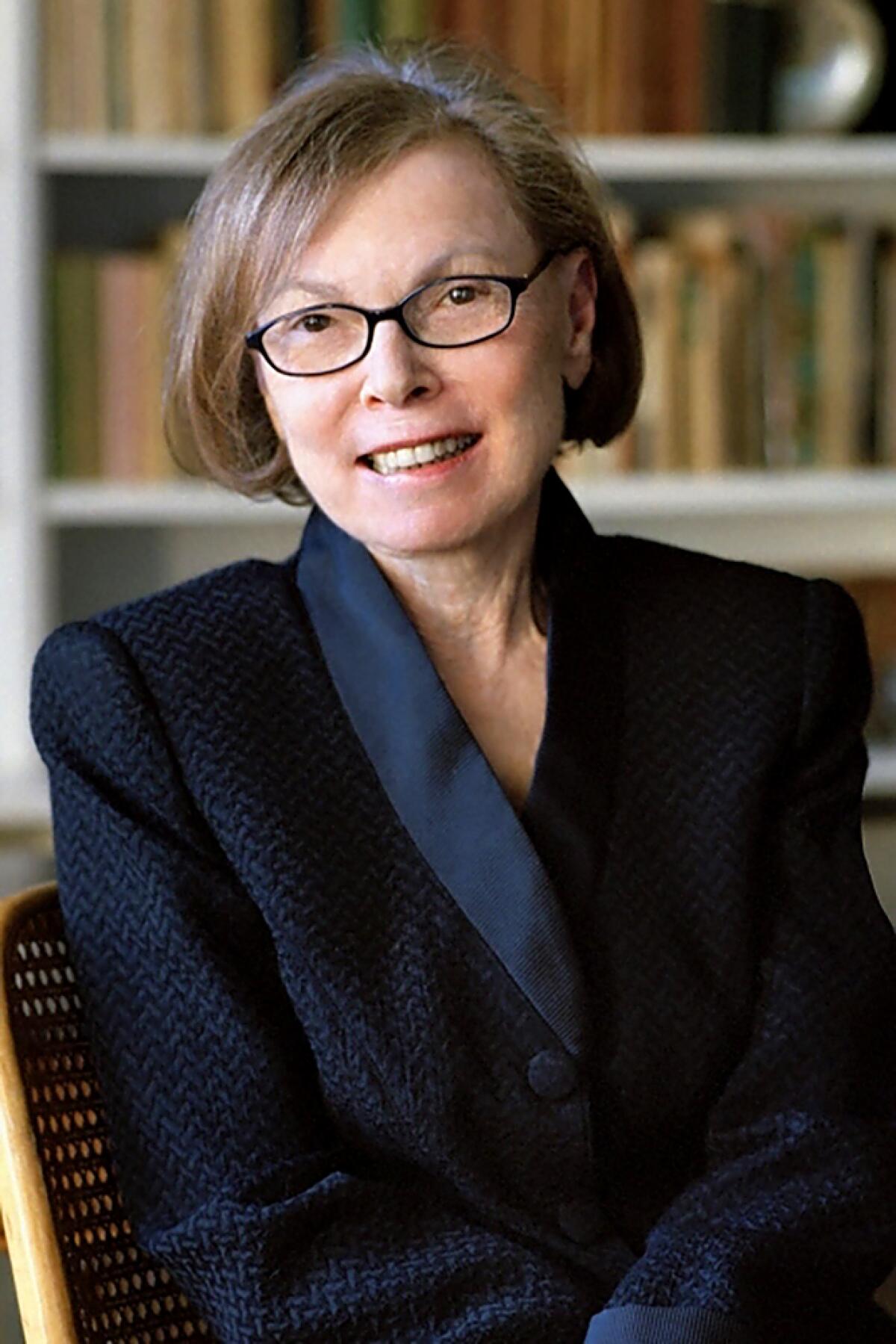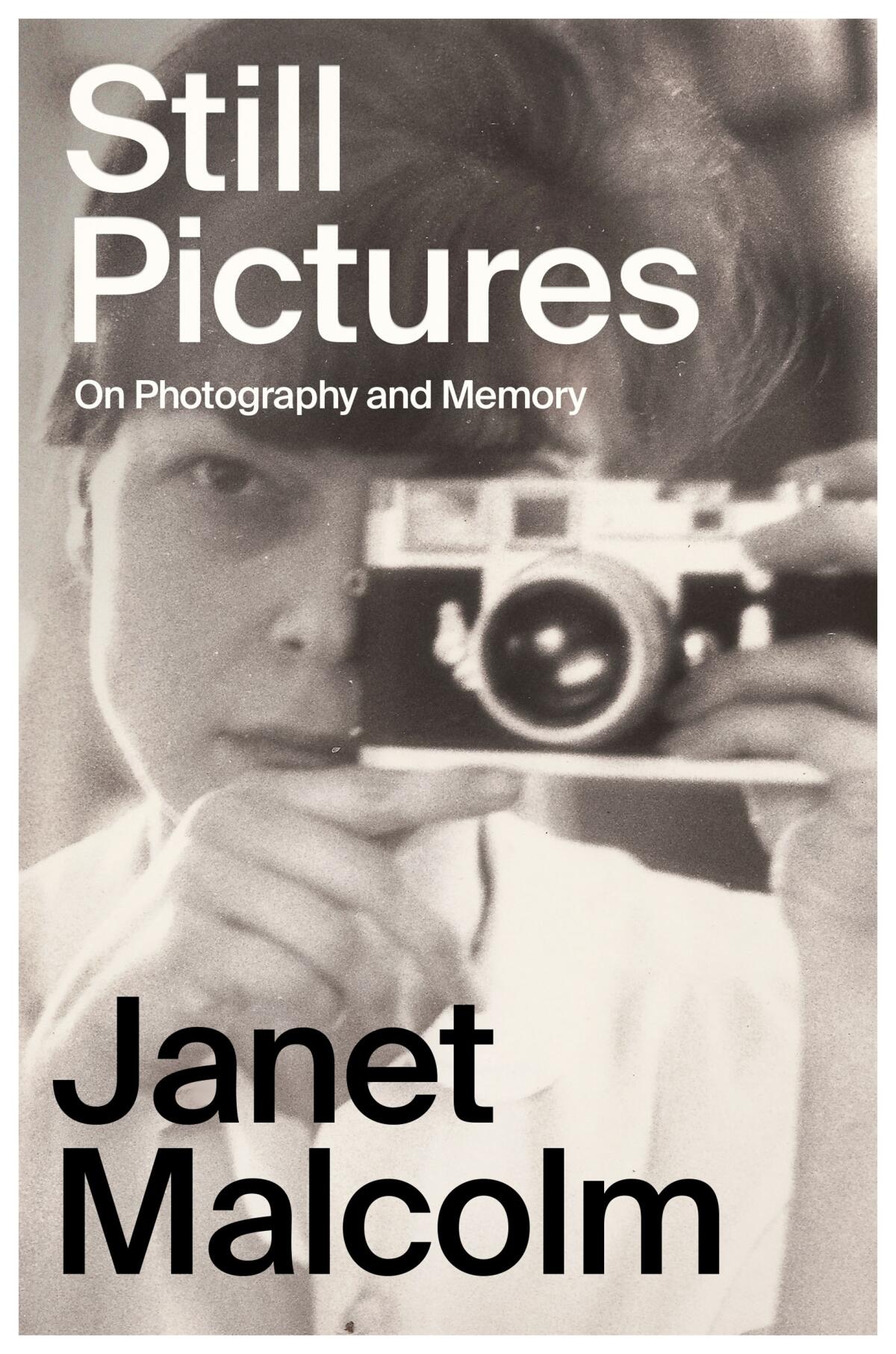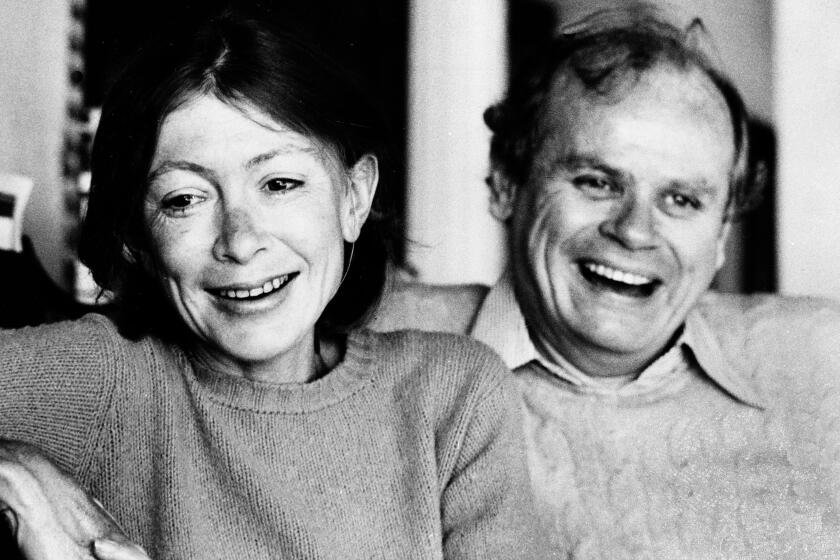How Janet Malcolm, at death’s door, finally took on her toughest subject — herself

- Share via
On the Shelf
'Still Pictures: On Photography and Memory'
By Janet Malcolm
FSG: 176 pages, $26
If you buy books linked on our site, The Times may earn a commission from Bookshop.org, whose fees support independent bookstores.
After Janet Malcolm died in June 2021, the announcement that she still had a book in the works was something of a balm — or an exercise in magical thinking. She has a new book coming out, so she can’t be dead. “Still Pictures: On Photography and Memory” will be released by FSG on Jan. 10.
The journalist and essayist of surgical precision got her start as a photography critic for the New Yorker. Her first book of essays, “Diana & Nikon” — also about photography — was published in 1980. “Still Pictures” is a collection of vignettes built around family photos. The most striking of these is a picture of Malcolm and her parents on a train leaving Prague in 1939, on their way to America, fleeing the Holocaust. “We were among the small number of Jews who escaped the fate of the rest by sheer dumb luck,” Malcolm writes, “as a few random insects escape a poison spray.”
Malcolm is a literary monolith, a more stony, icy Joan Didion. Both died, nearly the same age, in 2021. Both turned, in later writings, to more personal losses and regrets — and yet how different the results. Didion plunged into the pain as deeply as she could, Malcolm only as deeply as she dared.
After my review copy of “Still Pictures” arrived in my mailbox, I jumped right in and started gulping it down. But suddenly, I couldn’t continue. I went to my bookshelves and found myself pulling down Malcolm’s other books. “The Journalist and the Murderer,” “In the Freud Archives,” “Two Lives: Gertrude and Alice” and the first Malcolm book I encountered, “The Silent Woman,” on Sylvia Plath. I reread them all, back-to-back, over the course of two weeks. Her portraits of people are chillingly brilliant.
Longtime New Yorker writer and author Janet Malcolm, who died Wednesday, was known for her challenging critiques on a wide range of subjects.
Here she is in “The Journalist and the Murderer,” watching Jeffrey MacDonald, the man convicted of murdering his two daughters and pregnant wife, eat in a prison cafeteria: “He handled the doughnuts — breaking off pieces and unaccountably keeping the powdered sugar under control — with the delicate dexterity of a veterinarian fixing a broken wing.” The simple passage contributes more to the reader’s understanding of who MacDonald is than all 976 pages of “Fatal Vision,” the book over which the convict sued author Joe McGinniss.
While I relished the Malcolm of books past, “Still Pictures” languished on my nightstand, with Malcolm’s face gazing at me from behind a camera, in judgment. As I was changing the sheets in my bedroom, it hit me. If I finished it, Malcolm would really be dead. There would be no more books.

“Still Pictures” is deeply personal, and Malcolm is not afraid to say that this kind of writing does not come naturally to her. “I’m not sure that I am ready to write about my mother yet,” she writes in a piece about her mother. Reading about her parents is no easier than writing about them. “I have been reading — not happily — letters that my mother wrote to me in the nineteen-fifties.” The book begins with her family, moves on to other Czech acquaintances and Malcolm’s school days and ends rather abruptly with a reflection on her late husband, Gardner Botsford.
The most affecting of these pieces cover the experience of other Czech refugees making new lives in New York. “Malva always wore black, and it was not necessary to ask her why. She was in mourning for her husband, her two children, their spouses, and her granddaughter, who had been murdered at Auschwitz. ... She never smiled. She was kindly and indifferent. I cannot say any more.”
Malcolm was suffering from lung cancer when she wrote this book. In the introduction, her friend and New Yorker colleague Ian Frazier writes, “she endured horrible physical pain. If I could’ve taken the pain for two or three hours a day to give her a break, I would have.” A sense of paralyzing agony runs through every piece — if not physical then cerebral. “I would rather flunk a writing test than expose the pathetic secrets of my heart,” Malcolm writes. “The prerogative of cowardly withholding is precious to the most apparently self-revealing of writers. I apologetically exercise it here.”
Joan Didion, who died Thursday, left a seismic impact on the literary world and her home state of California.
One vignette, “On Being Sick,” gives us hope that we might encounter Malcolm’s experience with cancer, or with dying. Instead it is a piece on being ill as a child, and the rich meals her mother would cook for her and her sister.
The afterword of this book is written by Malcolm’s daughter, Anne. “The book in your hands was supposed to have one last chapter, which my mother’s final illness did not allow her to write.” But it seems that Malcolm was fated to withhold her final conclusions no matter the timing. In a fragment of an autobiography that was abandoned, she wrote, “I cannot write about myself as I wrote about the people I have written about as a journalist. ... They have dictated their stories to me and I have retold them. They have posed for me and I have drawn their portraits. No one is dictating to me now.”
The failures of this book are what give it its weight. “Memory does not narrate or render character,” she writes. “Memory has no regard for the reader.” It is sadly and ultimately true. Readers looking for the cutting and flinty Malcolm of earlier books will not find her here. There is something else, more subtle but perhaps more important, about our inability to capture our own “still pictures” of our lives, even with the chronicling tools of photography or writing. They cling to us in a way that makes them impossible to render accurately.
In “Daddy,” which appears at the beginning of the book, Malcolm attempts a portrait of her beloved father. “He left more traces of his existence than most people do, because he was always writing things down, on little cards, on onionskin paper (his poems), in diaries, even on the walls of the cabin on a lake where he and my mother spent weekends and summer holidays.”
Writer Janet Malcolm wrote challenging critiques on a range of subjects — murder cases as well as journalism itself.
This portrait is barely six pages long. But Malcolm’s words can still cut like a knife. “He was a wonderful father. I know he dearly loved my sister and me. But he loved his own life more and seemed to have hated leaving it more than most men and women do. ... I am flooded with things I want to say about him.”
Malcolm was one of our greatest writers, which makes the lesson of “Still Pictures” only the more poignant. Her final volume proves that even the finest chroniclers can still be leveled by their own lives, and that the memories that make us human are the foggiest and most ephemeral. This reader is flooded with the desire to have seen Malcolm manage it. That’s life. But what a loss!
Ferri is the owner of Womb House Books and the author, most recently, of “Silent Cities San Francisco.”
More to Read
Sign up for our Book Club newsletter
Get the latest news, events and more from the Los Angeles Times Book Club, and help us get L.A. reading and talking.
You may occasionally receive promotional content from the Los Angeles Times.













